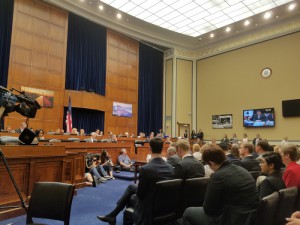So-Called “First Amendment Defense Act” Would Actually Weaken Civil Liberties
 House committee hearing on the First Amendment Defense Act (FADA)
House committee hearing on the First Amendment Defense Act (FADA) Yesterday I had the opportunity to attend a U.S. House committee hearing on the First Amendment Defense Act (FADA). The Committee on Oversight and Government Reform, chaired by Rep. Jason Chaffetz (R-Utah), heard from a panel of expert witnesses on the scope and effect of FADA.
Introduced by Rep. Raúl Labrador (R-ID), FADA would prohibit the government from taking “discriminatory actions” against a person who holds or acts on a “religious belief or moral conviction that marriage is or should be recognized as the union of one man and one woman,” or the belief that “sexual relations are properly reserved to such a marriage.” If the government took such an action against a person, he or she would then be entitled to sue the government and seek damages.
Ranking member Rep. Elijah Cummings (D-MD) noted that the committee received over eighty letters asking Congress to cancel the hearing, including a letter from over 3,000 clergy and religious organizations. The American Humanist Association and other secular organizations were among the signees. (Read their letter here.) Yet despite this strong opposition, Congress scheduled the hearing— exactly one month after the mass shooting at a gay night club in Orlando, Florida, which killed more than fifty people.
Senator Mike Lee (R-UT), who co-sponsored the bill’s Senate version, insisted FADA was a response to the US Supreme Court’s landmark decision in Obergefell v. Hodges that legalized same-sex marriage. It’s unclear what impact Obergefell will have on religious groups who object to same-sex marriage, he argued, and FADA would protect them from losing their tax exempt status, being denied federal funding, or being excluded from government contracts.
When questioned by the Democratic minority, Professor Katherine Franke of Columbia Law School testified that FADA would allow businesses, employers, landlords, and hospitals to discriminate against the LGBT community and unmarried parents if they demonstrate they have a sincerely held religious or moral objection to same-sex marriage or premarital sex.
According to Franke, FADA would allow hospital staff who see homosexuality as an abomination to deny a gay man access to his partner’s sick bed. It would allow landlords who believe premarital sex is a sin to refuse to rent to families with children born out of wedlock. It would place one person’s religious beliefs above the worth and dignity of other people.
Former Congressman Barney Frank (D-MA), the first acting member of Congress to come out as gay, added that federal law doesn’t protect LGBTQ people from discrimination. Only nineteen states and the District of Columbia explicitly prohibit discrimination based on sexual orientation and gender identity and expression. Even if there were comprehensive civil rights protections, FADA would actually prevent the government from enforcing them because it would be considered discrimination against religious objectors.
Cummings compared FADA to racial discrimination under Jim Crow. He saw no significant difference between the discrimination he faced as a black man and the discrimination LGBTQ people face today. Franke added that the arguments made in support of FADA were once made in support of segregation by religious groups who attested that God created the races separate and that the white race was superior to others.
Rep. Ted Lieu (D-CA) rightly noted that America is not a theocracy. The Framers of the Constitution saw theocratic regimes and adopted the Establishment Clause of the First Amendment to safeguard our liberties. Passing FADA would give preferential treatment to religious groups who subscribe to a particular scriptural interpretation condemning same-sex marriage and premarital sex. Humanists agree with Lieu: FADA’s a step towards theocracy, and one we best not take. Contact your members of Congress today to voice your opposition to this dangerous and misleading legislation.
